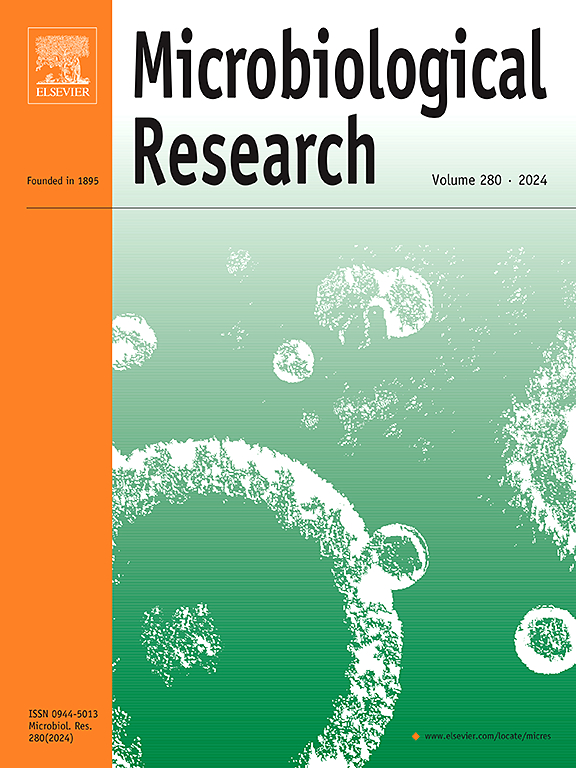Outer membrane protein A mediates Klebsiella pneumoniae penetration of the blood-brain barrier and induces bacterial meningitis
IF 6.1
1区 生物学
Q1 MICROBIOLOGY
引用次数: 0
Abstract
Klebsiella pneumoniae is an important meningeal pathogen. Penetration of the blood-brain barrier (BBB) is a prerequisite for K. pneumoniae meningitis, although the underlying mechanisms remain unclear. Our study found that outer membrane protein A (OmpA), a virulence factor of K. pneumoniae, facilitates BBB penetration and induces K. pneumoniae meningitis. Experimental results revealed that the mucoviscosity, biofilm formation, capsular polysaccharide production, serum resistance, in vitro competitiveness, and motarlity rates in Galleria mellonella were markedly reduced in an ompA deletion strain (FK3907 ΔompA). In a mouse meningitis model, significant reductions in bacterial loads, mortality rate, clinical symptoms, and brain tissue damage were observed in mice infected with FK3907 ΔompA compared to FK3907 (wild-type) and FK3907 ΔompA+ompA strains. Furthermore, the wild-type strain demonstrated a markedly enhanced ability to disrupt the BBB both in vitro and in vivo compared to the FK3907 ΔompA strain. This enhancement involved not only the rearrangement of F-actin in bEnd.3 cells but also the activation of an inflammatory cytokine storm. Importantly, the wild-type strain exhibited significantly enhanced adhesion, invasion, and intracellular proliferation within RAW264.7 cells. A wound healing assay indicated that wild-type strain promoted RAW264.7 cell migration. Collectively, we identified OmpA as a required virulence factor and essential pathogenic factor for K. pneumoniae. It promotes K. pneumoniae penetration BBB via transcellular pathway, trojan horse pathway, and pro-inflammatory pathway. Our study improves an in-depth understanding for K. pneumoniae penetration BBB from the perspective of bacterial-host interactions, highlighting OmpA as a potential target for intervention in K. pneumoniae meningitis.
外膜蛋白A介导肺炎克雷伯菌对血脑屏障的渗透,诱发细菌性脑膜炎
肺炎克雷伯菌是一种重要的脑膜病原体。穿透血脑屏障(BBB)是肺炎克雷伯菌脑膜炎的先决条件,尽管其潜在机制尚不清楚。本研究发现,肺炎克雷伯菌的毒力因子外膜蛋白A (OmpA)可促进血脑屏障渗透,诱发肺炎克雷伯菌脑膜炎。实验结果表明,ompA缺失菌株(FK3907 ΔompA)显著降低了mellongalleria的黏度、生物膜形成、荚膜多糖产生、血清抗性、体外竞争力和死亡率。在小鼠脑膜炎模型中,与FK3907(野生型)和FK3907 ΔompA+ompA菌株相比,感染FK3907 ΔompA的小鼠细菌载量、死亡率、临床症状和脑组织损伤显著减少。此外,与FK3907 ΔompA菌株相比,野生型菌株在体外和体内都表现出明显增强的破坏血脑屏障的能力。这种增强不仅涉及到弯曲中f -肌动蛋白的重排。3个细胞也激活了炎症细胞因子风暴。重要的是,野生型菌株在RAW264.7细胞内表现出显著增强的粘附、侵袭和细胞内增殖。伤口愈合实验表明野生型菌株促进RAW264.7细胞迁移。总之,我们确定了OmpA是肺炎克雷伯菌必需的毒力因子和必需的致病因子。它通过跨细胞途径、特洛伊木马途径和促炎途径促进肺炎克雷伯菌渗透血脑屏障。我们的研究从细菌-宿主相互作用的角度深入了解了肺炎克雷伯菌渗透血脑屏障的情况,突出了OmpA作为肺炎克雷伯菌脑膜炎干预的潜在靶点。
本文章由计算机程序翻译,如有差异,请以英文原文为准。
求助全文
约1分钟内获得全文
求助全文
来源期刊

Microbiological research
生物-微生物学
CiteScore
10.90
自引率
6.00%
发文量
249
审稿时长
29 days
期刊介绍:
Microbiological Research is devoted to publishing reports on prokaryotic and eukaryotic microorganisms such as yeasts, fungi, bacteria, archaea, and protozoa. Research on interactions between pathogenic microorganisms and their environment or hosts are also covered.
 求助内容:
求助内容: 应助结果提醒方式:
应助结果提醒方式:


